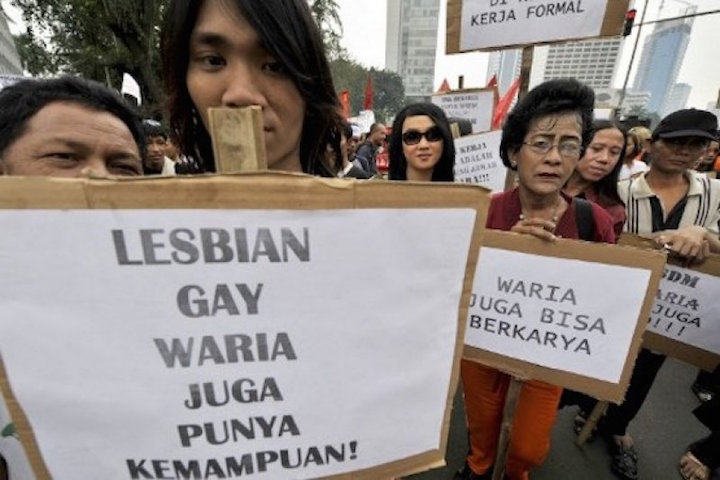
Backflips, confusion continue over Indonesian sex laws

A lawmaker from Indonesia’s House of Representatives has claimed foreigners “need not worry” about proposed laws criminalising extramarital sex, contained in the draft revision to Indonesia’s criminal code
Teuku Taufiqulhadi, a member of the working committee on the proposals, said he had met with ambassadors from European nations and explained to them that charges under Article 417 of the proposed bill can only be made by immediate family members of the accused, detiknews reported today.
“So clearly, foreigners will not be charged under this article just because they are not husband and wife,” Teuku said.
Article 417 of the bill states that extramarital sex would be punishable by up to 12 months in prison.
As marriage equality does not exist in Indonesia, it has been widely interpreted to apply to same-sex couples, as well as unmarried heterosexual couples, and married heterosexual people committing adultery.
Teuku’s comments follow similar comments from Indonesia’s Justice and Human Rights Minister, Yasonna Laoly, about Article 419, which deals with cohabitation.
Article 419 would make cohabitation by unmarried couples a criminal act that can be reported by third parties, including village heads, and punished by up to six months in prison.
Despite this, Yasonna has claimed charges can only be laid if a police report is received from either the parents or children of the accused.
“If a foreigner is accused of cohabitation … their parents must come, or their children, to report,” Yasonna told detiknews last week.
Confusion
The lack of clarity around the proposed laws against extramarital sex began almost as soon as they were announced, with the Indonesian president himself, Joko Widodo (Jokowi), quickly expressing doubts and concerns about the draft legislation.
On Friday, Jokowi directed his government to delay ratification of the controversial criminal code.
“I have ordered the Law and Human Rights Ministry to convey [my] stance to the House, that the passing of the criminal code bill into law should be postponed and that the bill should not be passed during the current sitting period,” said Jokowi, who added the bill would be “thoroughly reviewed”.
However, conservative forces within his government are known to be at odds with Jokowi, and elements of the president’s own support base do not necessarily share his views on the issue.
Warnings
The Australian government’s Smart Traveller website, meanwhile, has updated its travel advice for Indonesia, to include information on the criminal code revisions.
“The Indonesian parliament is in the process of passing a revised criminal code … A large number of laws may change and these will also apply to foreign residents and visitors, including tourists,” the website now states.
“Among others, these may prohibit: adultery or sex outside of marriage, encompassing all same-sex sexual relations.”
The Smart Traveller update said proposed changes to the criminal code would not come into effect until two years after they had been passed.
The update follows comments from gay rights campaigner and just.equal spokesperson Rodney Croome, who – speaking with the Star Observer last Friday – flagged the idea of warnings from Smart Traveller and Australian airlines, should the legislation be passed into law.
It’s complicated
The status of LGBTI people is complicated in Indonesia. Unlike many Muslim majority nations, homosexuality has never been illegal in the archipelago, with the exception of the outlying province of Aceh.
Homosexuality was made illegal in Aceh in 2005, when local lawmakers were granted a form of Sharia law by the federal government, in a bid to pacify separatists who wanted to secede from Indonesia.
Expressions of transgender identity have long been part of Indonesian culture, with the Bugi people of South Sulawesi province traditionally recognising five separate genders.
In Java, the lengger lalang dancers – male dancers who wear traditional Javanese female attire – have performed flamboyant public dances for centuries.
Trans people also feature in popular culture across the archipelago; the most notable example is perhaps Dorce Gamalama, a famous pop singer, author and talk show host.
Crackdown
However, Indonesia’s reputation for relatively tolerant, moderate attitudes towards LGBT people has been seriously challenged in recent years, with anti-gay rhetoric from politicians and authority figures becoming commonplace.
In the early 2000s, a federal bill to criminalise homosexuality – along with cohabitation, adultery and witchcraft – was mooted. It was narrowly voted down by parliament in 2003.
In 2017, the situation took a turn for the worse when authorities started targeting the LGBT community under the pretext of pornography related offences.
Police launched multiple raids on gay saunas in Jakarta in 2017. In the most high-profile incident, 141 men were arrested in May that year over an alleged “gay sex party” at the Atlantis Sauna in the city’s north.
The sauna, like most gay venues in Indonesia, has since closed.









